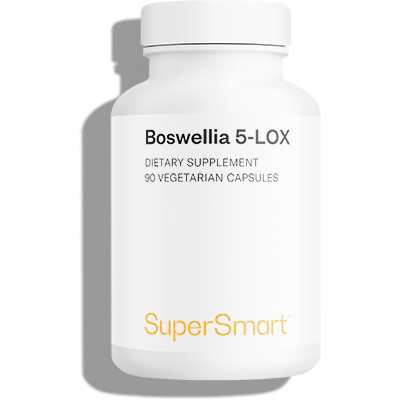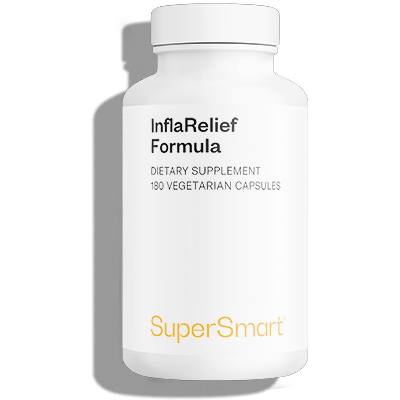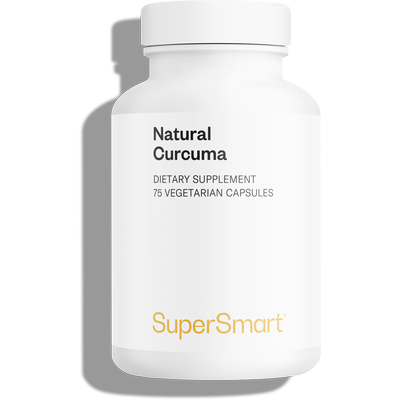31-10-2018
Reduce inflammation to reduce the risk of diseases
 While inflammation is a natural and helpful process at least in the short-term, it also promotes various pathological developments. Recent studies have revealed an interaction between pro-inflammatory lipoxygenase enzymes, particularly 5-LOX, and cancer, heart disease and asthma, amongst others. Cyclooxygenase enzymes are also strongly implicated in a number of diseases. The use of natural inhibitors of these enzymes, such as extracts of curcumin or boswellia, can help reduce the risk of developing these diseases.
While inflammation is a natural and helpful process at least in the short-term, it also promotes various pathological developments. Recent studies have revealed an interaction between pro-inflammatory lipoxygenase enzymes, particularly 5-LOX, and cancer, heart disease and asthma, amongst others. Cyclooxygenase enzymes are also strongly implicated in a number of diseases. The use of natural inhibitors of these enzymes, such as extracts of curcumin or boswellia, can help reduce the risk of developing these diseases.
In the last decade, scientists have discovered a key enzyme called cyclooxygenase-2, or COX-2, produced in response to inflammatory stimuli, which has been identified as an important link in the inflammatory cascade. Research has revealed that cells convert phospholipids in cell membranes into arachidonic acid, which then acts as a substrate that generates prostaglandins and leukotrienes - two powerful and potentially harmful sub-groups of the eicosanoid family of inflammatory mediators.
Eicosanoids are produced from arachidonic acid by the action of two enzymes that form the crux of the dual inflammatory pathway: cyclooxygenase (COX) and lipoxygenase (5-LOX).
COX-2 and COX-1
There are two forms of COX enzyme proteins: COX-1 and COX-2. COX-1 is involved in a number of beneficial physiological processes, such as the formation of prostaglandins which protect internal stomach tissue and kidney function. It is, however, also responsible for production of thromboxane A2 which promotes abnormal blood clotting (thrombosis) leading to heart attack and stroke. COX-2 is directly involved in the spread of cancer cells and chronic inflammation.5-LOX generates inflammatory molecules
5-LOX generates inflammatory leukotrienes – powerful mediators that play an important role in allergic reactions. They may also be involved in ischaemia and atherosclerosis. Stroke, traumatic brain injury and Alzheimer’s disease have also been linked to 5-LOX and leukotriene activity.Studies suggest that blocking COX-2 while ignoring the effects of 5-LOX may be counter-productive. In fact, using COX-2 inhibitors may actually cause an increase in levels of 5-LOX, exacerbating, rather than improving, inflammation. This ‘rebound’ inflammation is caused by redirecting arachidonic acid toward synthesis of damaging leukotrienes through the 5-LOX pathway.
5-LOX involved in development of prostate cancer
Studies suggest that 5-LOX directly stimulates the spread of prostate cancer cells via a number of well-defined mechanisms. In addition, arachidonic acid is metabolised by 5-LOX into 5-HETE, a powerful survival factor used by prostate cancer cells to avoid destruction.Biopsies taken from prostate cancer patients show high concentrations of the enzyme 5-LOX1. Other research indicates that human prostate cancer cells are destroyed by 5-LOX inhibitors, suggesting that inhibitory agents such as fish oils, lycopene, saw palmetto and 5-LOXIN® Boswellia extract may have applications in preventing or blocking the growth of prostate cancer. 2.
5-LOXIN®
5-LOXIN® is a proprietary extract standardised in Boswellia serrata which provides 30% acetyl-11-keto-beta boswellic acid (AKBA). Recent research has identified AKBA as the most powerful of all the boswellic acids. 5-LOXIN® binds directly to 5-LOX, inhibiting its activity. In an animal study comparing the efficacy of 5-LOXIN® with that of the anti-inflammatory ibuprofen, 5-LOXIN® produced a 27% reduction in inflammation against 37% produced by the drug3. In another study, 5-LOXIN® produced a 55% reduction in inflammation, similar to that provided by the non-steroidal anti-inflammatory (NSAID) prednisone, but was particularly well-tolerated 4.Inhibition of inflammation and colon cancer
A certain amount of discussion has centred on the use of COX-2 inhibitors – prescription drugs such as Celebrex® or Vioxx® - as potentially providing protection against colon cancer. This new approach stems from the fact that patients routinely taking NSAIDs have a statistically lower risk of developing cancer than those who do not take them. Unfortunately, NSAIDs are poorly-tolerated and may even cause gastrointestinal bleeding. Researchers believe that natural COX-2 inhibitors, such as curcumin or some phytosterols, have demonstrated chemopreventive efficacy against colon carcinogenesis, with minimal gastrointestinal toxicity5.Lowering the risk of atherosclerosis by reducing inflammation
Inflammation is an important contributory factor in atherosclerosis and the development of heart disease. The use of Boswellia, and more specifically 5-LOXIN®, inhibits 5-LOX and reduces inflammation, and may constitute a key element in preventing and treating atherosclerosis. 5-LOX appears to contribute to atherosclerosis in several ways: increases in 5-LOX lead to excess leukotriene production which chemically stimulates white cells to adhere to arterial walls. Furthermore, leukotrienes may promote vascular permeability and LDL oxidation. These combined effects may promote the development of atherosclerotic plaques in the arteries.Improves asthma symptoms
Inflammation of the respiratory tract is an important factor in the development of asthma symptoms. By blocking LOX-5-induced production of leukotrienes, boswellia extract can often relieve asthma’s characteristic breathing difficulties.Good results with inflammatory bowel disease
Ulcerative colitis and Crohn’s disease are inflammatory bowel diseases. The first affects mainly the colon, while the second can affect the whole gastrointestinal system. These auto-immune diseases are characterised by symptoms such as severe gastrointestinal pain, cramps, diarrhoea, fatigue, weight loss and malnutrition. In a study conducted in Germany on patients with inflammatory bowel disease, Boswellia extract produced significant improvements in symptoms.
In a clinical trial of 30 patients suffering from ulcerative colitis, 20 took boswellia extract, and 10 an NSAID, three times a day for six weeks. 90% of the boswellia subjects showed improvement in their condition, compared with only 60% of the NSAID group. In addition, 70% of the boswellia-supplemented subjects went into disease remission, as against just 40% of the NSAID-treated patients6.
Références :
1. Gupta S. et al., lipoxygenase-5 overexpressed in prostate adenocarcinoma, Cancer, 2001 Feb 15, 91(4): 737-43.
2. Matsuyama M. et al., Expression of lipoxygenase in human prostate cancer and growth reduction by its inhibitors, Int. J. Oncol., 2004 Apr, 24(4): 821-7.
3. Roy S. et al., Human genome screen to identify the genetic basis of the anti-inflammatory effects of Boswellia in microvascular endothelial cells, DBA cell Biol., 2005 Apr, 24(4): 244-55.
4. Roy S. et al., regulation of vascular responses to inflammation: inducible matrix metalloproteinase-3 expression in human vascular endothelial cells is sensitive to anti-inflammatory Boswellia, Anti Redox Signal, 2006 Mar, 8(3-4): 653-60.
5. Reddy B.S. et al,. Novel approaches for colon cancer prevention by cyclooxygenase-2 inhibitors, J. Environ. Pathol. Toxicol. Oncol., 2002, 21(2): 155-64.
6. Gupta I. et al., Effect of gum resine of Boswellia serrata in patients with chronic colitis, Planta Med., 2001 Jul, 67(5): 391-5.
In a clinical trial of 30 patients suffering from ulcerative colitis, 20 took boswellia extract, and 10 an NSAID, three times a day for six weeks. 90% of the boswellia subjects showed improvement in their condition, compared with only 60% of the NSAID group. In addition, 70% of the boswellia-supplemented subjects went into disease remission, as against just 40% of the NSAID-treated patients6.
Références :
1. Gupta S. et al., lipoxygenase-5 overexpressed in prostate adenocarcinoma, Cancer, 2001 Feb 15, 91(4): 737-43.
2. Matsuyama M. et al., Expression of lipoxygenase in human prostate cancer and growth reduction by its inhibitors, Int. J. Oncol., 2004 Apr, 24(4): 821-7.
3. Roy S. et al., Human genome screen to identify the genetic basis of the anti-inflammatory effects of Boswellia in microvascular endothelial cells, DBA cell Biol., 2005 Apr, 24(4): 244-55.
4. Roy S. et al., regulation of vascular responses to inflammation: inducible matrix metalloproteinase-3 expression in human vascular endothelial cells is sensitive to anti-inflammatory Boswellia, Anti Redox Signal, 2006 Mar, 8(3-4): 653-60.
5. Reddy B.S. et al,. Novel approaches for colon cancer prevention by cyclooxygenase-2 inhibitors, J. Environ. Pathol. Toxicol. Oncol., 2002, 21(2): 155-64.
6. Gupta I. et al., Effect of gum resine of Boswellia serrata in patients with chronic colitis, Planta Med., 2001 Jul, 67(5): 391-5.
Order the nutrients mentioned in this article

Dietary supplement containing 5-Loxin®, the most bioavailable and richest patented extract of Boswellia serrata for joint, gut and respiratory health, etc.
www.supersmart.comFurther reading
24-06-2019
Better known as PEA, palmitoylethanolamide is a natural and powerful active principle discovered in 1957. Since then, it has consistently been the subject of new...
Read more01-08-2018
Inflammation – whether unseen or painful – has always been at the root of a variety of incapacitating ‘diseases of civilisation’, such as cardiovascular disease,...
Read more29-07-2019
Magnesium has until now been mainly known as an essential mineral for nervous system balance, cardiovascular regulation, muscle function and bone health. Now it seems...
Read more© 1997-2026 Fondation pour le Libre Choix
All rights reserved
All rights reserved
Free
Thank you for visiting our site. Before you go
REGISTER WITHClub SuperSmart
And take advantage
of exclusive benefits:
of exclusive benefits:
- Free: our weekly science-based newsletter "Nutranews"
- Special offers for club members only



















